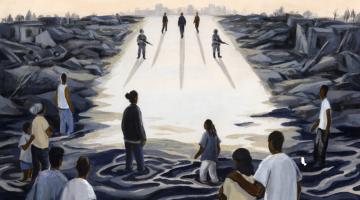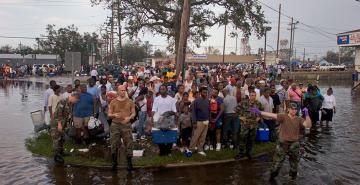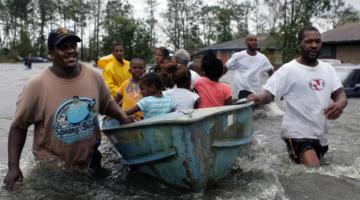“One must always be mindful of the kinship models one mobilizes to get people together in a quest for justice.”
In this series, we ask acclaimed authors to answer five questions about their book. This week’s featured author is Alaí Reyes-Santos. Reyes-Santos is an Associate Professor of Ethnic Studies at the University of Oregon. Her book is Our Caribbean Kin: Race and Nation in the Neoliberal Antilles.
How can your book help BAR readers understand the current political and social climate?
Our Caribbean Kin provides a lens to examine the possibilities for political solidarity across racial and ethnic differences at a time when we find our societies increasingly polarized. As Puerto Rico faces the devastating consequences of Hurricane Maria, it prompts us to ask how are Black communities, dark skinned Puerto Ricans and Dominican migrants being engaged, or not, by aid efforts and government officials. As the U.S. faces an increasingly visible wave of racism, white nationalisms, white supremacy, anti-Semitism, xenophobia and anti-migrant violence, it prompts us to ask how are we learning about each other’s struggles and what it means to be in solidarity with one another.
What do you hope activists and community organizers will take away from reading your book?
Well, first of all, activists and community organizers inspired this book. This book emerged from a reflection about what moves activists, community organizers, to be ethically engaged in the creation of political kinship; it also responded to what I perceived as multiple ideas of kinship informing Caribbean grassroots efforts, colonial, national, and transcolonial. As I spent time with community organizers in California, Oregon, and the Caribbean through a variety of political, pedagogical, and ceremonial collaborations, it became clear to me that one must always be mindful of the kinship models one mobilizes to get people together in a quest for justice. That colonial models may be dangerous, may replicate colonial ideas of race and gender and social difference, as well as ethnocentrism that privileges Global North epistemic systems; national models can be productive especially within environmental justice movements that appeal to an ethical care for land, but can also lead to the marginalization of those who do not fit what has been imagined as the ideal national subject and, in particular, migrants; that all models, including anti-racist, trans-colonial, inter-ethnic models may still risk falling into the traps of capitalism and heteropatriarchal norms. We mobilize at times these kinship models to galvanize people, to create consciousness, and they can be very effective; all I see myself doing is noticing when people have deployed them mindful of their potential limitations and re-imagining the possibilities of solidarity for Black peoples and others everywhere.
We know readers will learn a lot from your book, but what do you hope readers will un-learn? In other words, is there a particular ideology you’re hoping to dismantle?
Well, this is about my own un-learning process, un-learning histories of erasure of indigenous and Black peoples, un-learning ways in which U.S. academia perceives racism in the Caribbean as an aberration that transcends the aberration of racism in the U.S. – as if we do not all share this terrible colonial legacy; un-learning the silencing of Black Feminists and Queer voices in our communities; un-learning the vilification and dismissal of our Afro-descendant knowledge, healing and ceremonial practices as we seek to heal from the festering wounds of genocide, the slave trade, labor exploitation.
Who are the intellectual heroes that inspire your work?
The intellectual heroes that inspire my work . . . that is a very hard question to answer. Nicole King’s remarkable book on CLR James is one I keep nearby; it reminds me about how our political and artistic ancestors have opened new ways for us to see the world beyond the colonial lens, even as we are shaped by it in struggle. Audre Lorde’s writings always remind me to not be afraid of saying what is in my heart; it may take me somewhere even if I do not know it yet. My mom, a nurse, and my dad, a social worker, did not conceive of themselves as intellectuals, and yet their wisdom remains in all of my scholarship; the way they always said that you can never erase the plantain stain – a common saying in Puerto Rico. In other words, I could become a PhDand a professor, but the fact that they grew up as farmers, share croppers, first generation college students, and that I grew up in that small town in the mountains of Puerto Rico will forever define who I am and what I wish to know. They were the first ones to teach me that history and memory cannot be dismissed; that simply moving on without confronting ourselves is not a possibility.
In what way does your book help us imagine new worlds?
Well, I try to document contemporary quests for justice alongside literary imaginings of political solidarity to plant a seed of hope, potential, to remind us that if we cannot imagine, dream, create, we are dead in spite of the fact that we seem alive. Delving into culture, literature and art enables us to see what does not exist yet and re-imagine what is. The preface shares a story of an inter-ethnic ceremonial space in the Dominican Republic and ends with a Transnational Black Feminist Retreat in an attempt to remind the reader of what is possible if we dare to imagine from within our difference.
Roberto Sirvent is Professor of Political and Social Ethics at Hope International University in Fullerton, CA. He also serves as the Outreach and Mentoring Coordinator for the Political Theology Network. He’s currently writing a book with fellow BAR contributor Danny Haiphong called American Exceptionalism and American Innocence: The Fake News of U.S. Empire.



















